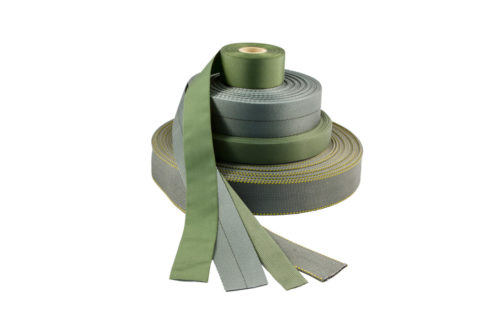BRM Reflects on Recreational, Safety and Medical Uses of Fabrics on National Textiles Day
Engineered woven webbing, tapes, and specialty materials, used in everyday life
In honor of National Textiles Day, Bally Ribbon Mills (BRM) is celebrating not only textiles and their myriad uses, but the front-line workers in various industries who are using these fabrics to save lives.
Held on May 3, National Textiles Day recognizes all the ways textiles improve lives. Since 1923, Bally Ribbon Mills has established itself as an industry leader in the design, development, and manufacture of highly specialized engineered woven fabrics, creating
products for aerospace, defense, medical, safety, automotive, commercial, and industrial applications. From recreational to essential uses, textiles play a role in our everyday lives.
Recreational and commercial use
As a pioneer of 3-D weaving technology, BRM creates tapes, webbing and other specialty fabrics from virtually any yarn – including nylon, polyester, aramid, graphite, glass, quartz, ceramic, and silicon carbide. Other specialty fabrics, like Kevlar®, Nomex®, Spectra® are used to create binding tape, chin straps, harnesses, packs, climbing webs, pet leashes, and parachute and balloon setups, which are available in light-weight binding to medium and heavy webbing.
Additionally, with much of today’s technology literally woven into the clothes or accessories we wear every day, designers at BRM are using its E-WEBBINGS® e-textile platform for a variety of applications. These woven narrow-fabrics are conductive, enabling the electronic transmission of data, sensations (light, noise, vibrations, heat), and power that can be stored or used to actuate/transform objects. Their unique conductive fibers can be woven in conjunction with other fibers and can be used in embedded sensors in both wearable and integral technology, including the Internet of Things
For example, a large fabric e-textile square produced by Bally Ribbon Mills can be placed into a custom application with small on-board battery and computer systems designed to sense environmental hazards, collect temperature and climate date, log distance and speed, and more. Consumer markets for clothing, outdoors equipment, and safety products also continuously turn to advanced textiles to gain a cutting-edge advantage.
Essential medical and safety fabrics
E-WEBBINGS® has also proven to be an essential fabric in the medical and safety fields, including fire, law enforcement, industrial, military, and commercial fall protection personal protective equipment (PPE).
Made from Nylon, Nomex®, Kevlar®, Vectran®, PBI®, Nextel®, and other specialty fibers, BRM’s safety webbing and tapes meet the demands of applications requiring high temperature, fully engineered safety solutions. They can be used for shoulder straps, harness webbing, and chin straps, as well as helmet suspension, binding tapes, lap belts, and shock absorbing webbing.
Responding to the global health crisis
In response to the current COVID-19 emergency, BRM is manufacturing urgently needed narrow woven structural tapes and elastics for use in a range of medical items. These include manufacturers of facemasks, face shields, gowns, other PPE, and medical patient soft goods, as well as patient slings, wheelchair harnesses, braces, and respiratory equipment.
BRM’s safety webbing and tapes are ideal for applications requiring high tenacity, abrasion resistance and flame and heat resistance. They are also a good choice for controlled elongation applications as well as those requiring chemical resistance in specific environments, as they offer conductivity, dimensional stability and strength, and can help to reduce weight and size. The materials meet United States (NFPA) requirements for fire fighters’ protective clothing and equipment.
This year, these specialty fabrics are more important than ever as our medical and safety professionals tirelessly work to assist those diagnosed with coronavirus. On National Textiles Day, we’re honored to be a part of the effort to equip our front-line works with the best fabrics available to ensure they can protect themselves and continue to save lives.
By Sarah Islam, Bally Ribbon Mills







